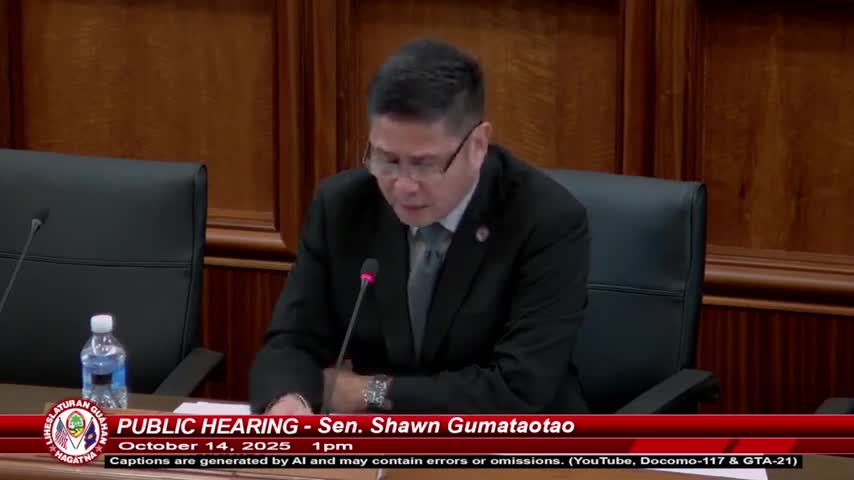Guam lawmakers and emergency officials spar over bill to move emergency management into Guam Fire Department
Get AI-powered insights, summaries, and transcripts
Subscribe
Summary
Lawmakers held a joint public hearing on bill 179-38 COR, a proposed act to abolish the Office of Civil Defense and create a Bureau of Emergency Management within the Guam Fire Department; witnesses warned the change could jeopardize federal grant eligibility, create operational conflicts and require a clearer funding plan.
Lawmakers held a joint public hearing on bill 179-38 COR, a proposed act to abolish the Office of Civil Defense (OCD) and create a Bureau of Emergency Management within the Guam Fire Department (GFD). The measure would reassign hazard mitigation to the Department of Public Works and set a mandated $1,000,000 annual local appropriation for the new bureau, according to the fiscal note provided by the Bureau of Budget and Management Research (BBMR).
The hearing drew split testimony from emergency-management professionals, the GFD and the Office of Homeland Security. Esther Agege, Guam Homeland Security adviser, told the committee she “respectfully submit[ted] this testimony in opposition to bill number 179-38,” arguing the proposal would “undermine effective emergency operations, contradict federal best practices, and jeopardize the island’s eligibility for critical federal funding.” Charles Stebbous, administrator of the Office of Civil Defense, said he was “in strong opposition” to abolishing the agency and described national studies showing independent emergency-management offices perform better than subordinate units.
Why it matters: witnesses said the bill raises legal, operational and fiscal risks at a time when federal grant rules and expectations are shifting. BBMR’s fiscal note—entered into the record—says the proposal includes a mandated $1,000,000 annual appropriation but that no funding for the new bureau is included in the governor’s FY2026 appropriation to GFD; BBMR warned funding would need offsets from other general-fund appropriations. Witnesses also noted withheld FEMA reimbursements identified in prior audits: the Office of Public Accountability and others testified that millions in federal reimbursements were delayed or withheld because of prior noncompliance.
Most testimony opposed consolidation. Lucia Perez of the Office of Homeland Security and Office of Civil Defense said the structural change “is inconsistent with Guam’s statutory framework, best practices in incident management, and the prevailing model” and warned that placing coordinating authority inside a single response department would “narrow that scope and risk subordinating coordination to a single tactical discipline.” Fire Capt. Nicholas Garrido, speaking for GFD operations (and offering the department’s written testimony), said GFD already “respond[s] to a wide spectrum of emergencies” and “adding a full-scale emergency-management duties … would spread both sides of our department too thin.”
Several witnesses urged alternatives to abolishment. Stebbous and others recommended strengthening and professionalizing OCD, expanding classified positions for continuity and grant-management expertise, and clarifying statutory authority rather than dissolving the office. Stebbous cited a July 2025 Argonne National Laboratory study and a 2024 National Emergency Management Association report that, he said, found freestanding emergency-management agencies more likely to meet community needs than those subordinate to response departments.
Supporters and outside experts said consolidation could create a more professional, stable organization if carefully implemented. David Fukutomi, a private-sector emergency-management adviser who served as a federal coordinating officer on Guam after Super Typhoon Pongsona, said he “speak[s] in favor of the bill” and praised GFD’s depth of trained leaders. Fukutomi urged a deliberate, phased transition and detailed implementation planning, noting that the bill as written is a high-level framework and that the “devil is in the details.”
Budget and federal grants: BBMR informed the committees that federal and local funds must not be commingled in the same fund and that FEMA public-assistance reimbursements require careful expenditure tracking. Multiple witnesses warned that a reorganization during active FEMA remediation or ongoing grants could disrupt compliance and delay reimbursements. The public auditor, Benjamin Cruz, praised GFD’s candor and recommended strengthening OCD to professional standards if the Legislature chooses not to reorganize.
Process and timing: No final action was taken during the hearing. Committee chairs announced that markup sessions on bill 179-38 COR and related bill 184-38 COR were tentatively scheduled for Oct. 28, 2025, and that written testimony would be accepted through Oct. 21, 2025. The committees asked stakeholders to submit proposed language and recommended changes for the markup process.
What was not decided: The hearing was an informational and policy-stage forum; there was no vote on the bill, no formal transfer of personnel or funds, and no federal determination about eligibility changes. Several witnesses noted the bill does not specify who would serve as the territory’s designated territory coordinating officer (TCO) or GAR for FEMA purposes after the change, nor does it include a detailed staffing, classification or funding plan for transferring grant management responsibilities.
The committees will consider testimony received in markup. Lawmakers said they will use the legislative process to address statutory qualifications, staffing classifications and transition steps before making structural changes.
